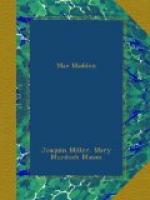Susie Hopkins was putting her hair up on crimping-pins, but she paused long enough to say: “Well, Jack Durkee had better hurry himself and his ring along, then.”
“O, he’s coming as quickly as ever he can,” laughed Miss Rae, whereat she proceeded to place a large letter and a picture under the left-hand pillow, crimped her hair, cold-creamed her lips, and laid her down to pleasant dreams of—Jack.
CHAPTER VI.
Mae was very much ashamed of herself the next morning. She had been restored in a measure to popular favor, through Eric, the day before. Edith and Albert were home from Frascati, when Eric made his raid bravely on their forces combined with those of Mrs. Jerrold. He advanced boldly. “It’s all nonsense, child, as she is,” he said. “It was natural enough, to talk with the man,” for Mae had made a clean breast of her misdoings to him, to the extent of saying that they had chatted after the beggar left. “Do forgive her, poor little proud tot, away across the sea from her mother. Albert, you’re as hard as a rock, and that Edith has no spirit in her,” he added, under his breath. This remark made Albert white with rage. Nevertheless, he put in a plea for his wayward, reckless little sister, with effect. After a few more remarks from Mrs. Jerrold, Mae came out of the ordeal; was treated naturally, and, as we have seen, accompanied Mrs. Jerrold to the play the night before.
Now, it was the next day. Mrs. Jerrold breakfasted in her own room again, and spent the hours in writing home letters full of the Peter and Paul reminiscences and quotations. Norman and Eric left for the Costanzi, and Albert and Edith, armed with books, and note-books, and the small camp-stools, again started away together. This last ‘again’ was getting to be accepted quite as a matter of course. Everybody knew what it meant. They always invited the rest of the company to go with them, and were especially urgent, this morning, that Mae should accompany them.
“Why, with mamma in her room you will be lonely,” suggested Edith, “and you can’t go out by yourself.”
Mae winced inwardly at this, but replied pleasantly: “I have letters to write also, and I’m not in the mood to-day for pictures, and the cold, chilling galleries filled with the damp breath of the ages.”
So Edith and Albert, nothing loth, having discharged their duty, started off. These two have as yet appeared only in the background, and may have assumed a half-priggish air in opposition and contrast to Mae. They really, however, were very interesting young people. Albert with a strong desire in his heart—or was it in his head?—to aid the world, and Edith with a clear self-possession and New England shrewdness that helped and pleased him. Their travels were enriching them both. Edith was trying to draw the soul from all the great pictures and some of the lesser ones, and Albert was waking, through




